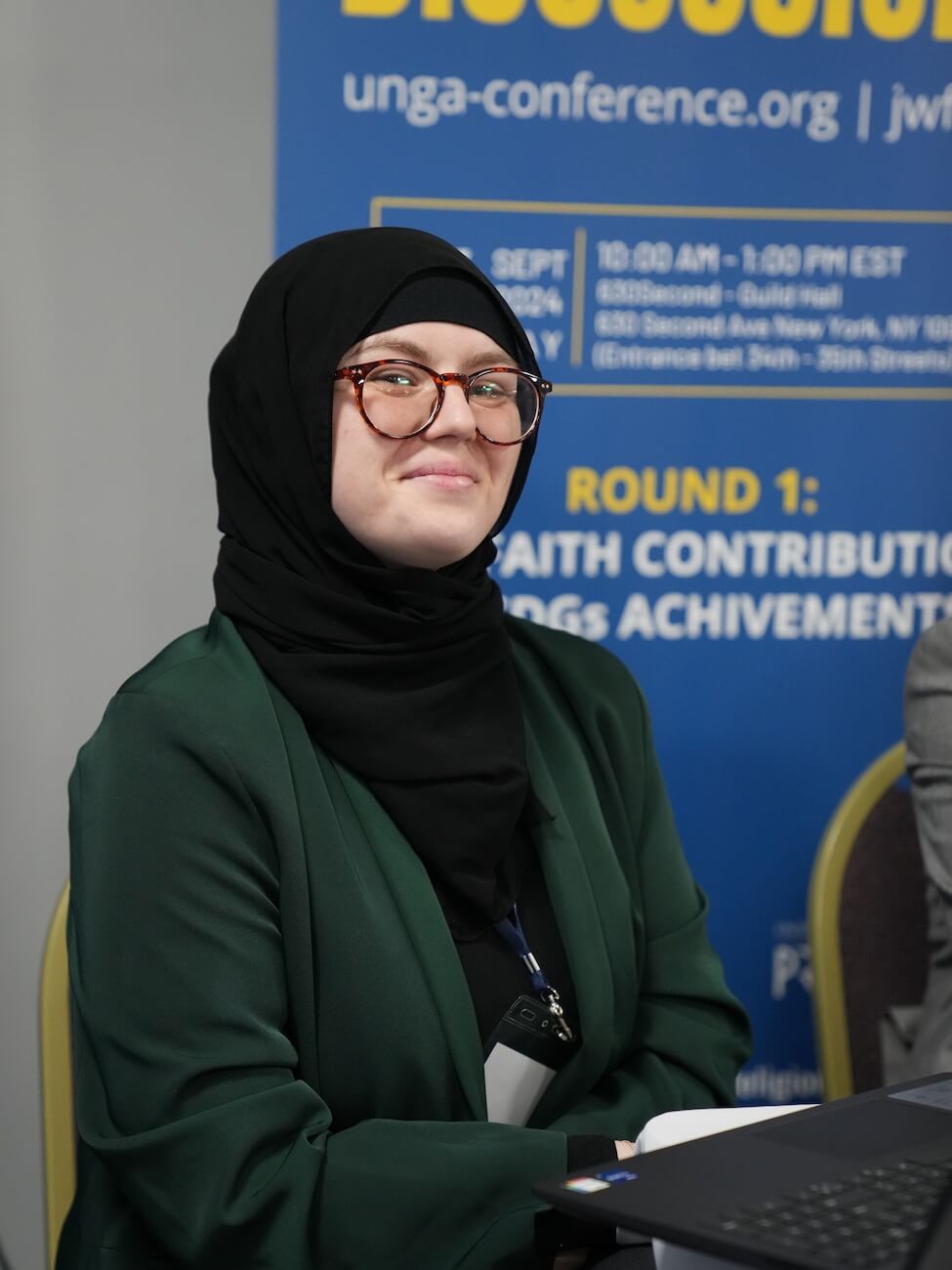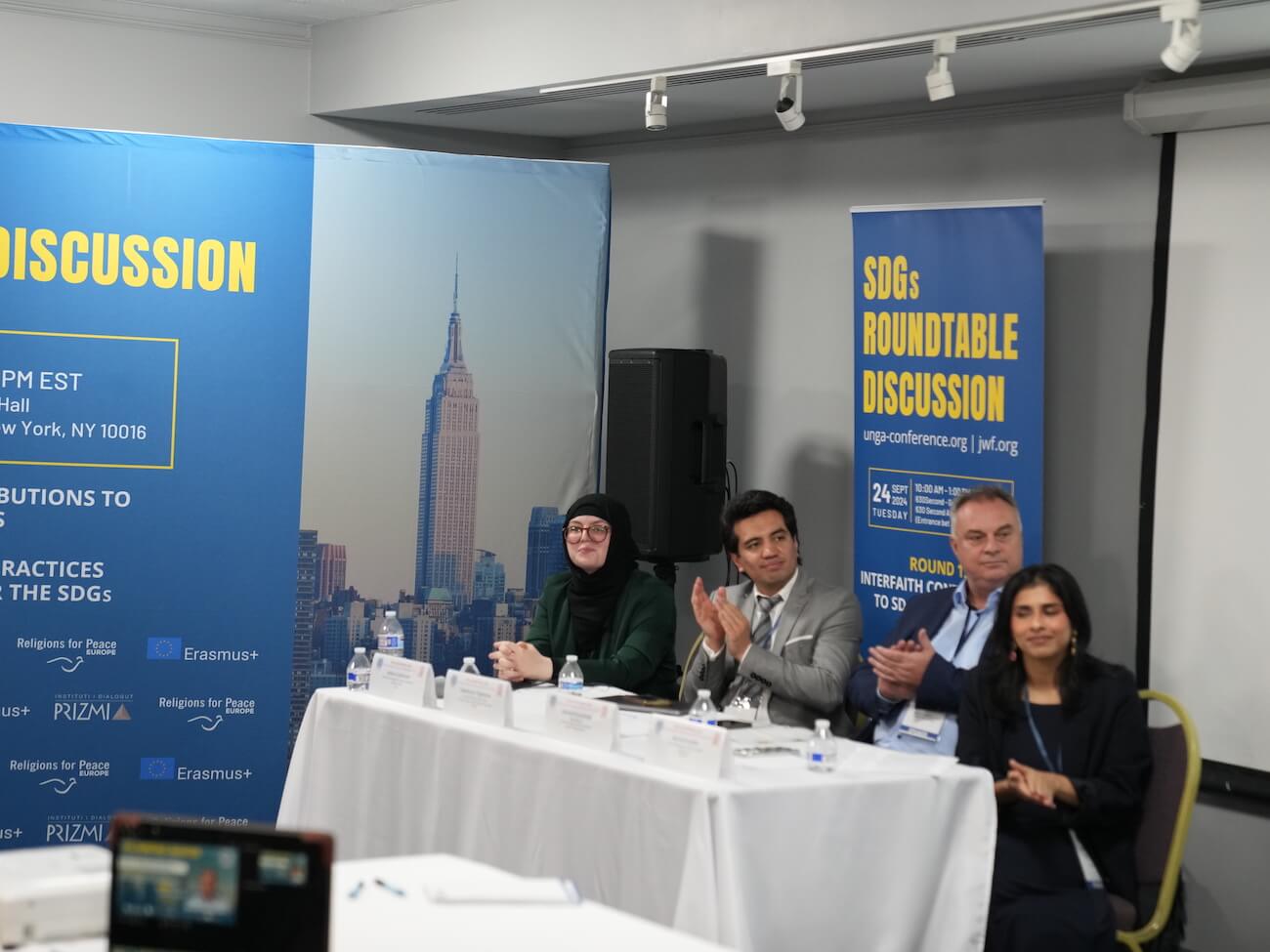Gender equality, educational opportunity for women and girls, and the economic empowerment of women are fundamental to the betterment of our world, and must be at the forefront of global efforts for sustainable development, according to Sarah Elsakhawy, Embrace Relief’s Program Coordinator for Women’s Empowerment.
Elsakhawy spoke on this topic as Embrace Relief’s representative at the SDGs Roundtable Discussion, held Sept. 24 in New York as part of the SDGs Conference 2024. The conference, coordinated by the Journalists and Writers Foundation, was held in the margins of the 79th session of the United Nations General Assembly and offered the opportunity for world leaders, non-governmental organizations, and civil society members to engage in productive discussions on the key issues facing our world today. Embrace Relief is proud to partner with the JWF on this critical event and is grateful for the opportunity to be represented in this ongoing dialogue.
Elsakhawy was one of five speakers to take part in the Roundtable Discussion’s second session, titled “Civil Society Best Practices and Initiatives for the SDGs.” Her presentation was centered on the global challenges faced by women and youth, especially in conflict-affected regions, and how Embrace Relief’s initiatives align with the SDGs to address these issues.
Elsakhawy began by highlighting the global education crisis, where over 244 million children and youth are out of school, many of whom live in conflict-affected areas. In these regions, safety concerns, gender discrimination, and economic hardships prevent children, particularly girls, from accessing education. She noted that studies have shown that literacy rates among youth in conflict zones can drop by over 20%, perpetuating poverty cycles. Elsakhawy emphasized that education is not just a fundamental right but also a critical tool for peacebuilding and economic development. According to UNESCO, an additional year of schooling can increase an individual’s income by up to 10% and reduce the risk of conflict by 20% in the long term.
A Critical Gender Gap
Women, however, are disproportionately impacted by poverty. Elsakhawy underscored that women aged 25 to 34 are 25% more likely to live in extreme poverty than men, with women in sub-Saharan Africa making up over 60% of the informal labor force, where job security, benefits, and financial resources are scarce. In Tanzania, one of several countries where Embrace Relief’s Women’s Empowerment program operates, the situation is particularly challenging, with only 6% of women having access to formal financial services and less than 10% owning land, despite their significant contributions to agriculture.
“The lack of economic opportunities for women has far-reaching implications,” she said. “When women are unable to access education, secure stable employment, or start their own businesses, the entire community suffers.”
Even in education systems, where women dominate the teaching workforce, leadership opportunities are often denied to them. Elsakhawy noted that in countries like Uganda and Malawi, women make up only a small percentage of school administrators, despite their majority presence as teachers. This gender imbalance extends to Tanzania, where Elsakhawy noted statistics from the Ilala District, one of five districts that make up the Dar es Salaam capital region. There, women represent 84.1% of primary school teachers, but hold only 38% of leadership roles as head teachers.
To break these barriers, Elsakhawy advocated for more equitable policies and leadership opportunities for women. She called for comprehensive solutions, including policy changes that promote gender equality, mentorship networks to support aspiring female leaders, and community engagement to shift societal attitudes about female leadership. In her view, empowering women through education and economic opportunities benefits entire communities, as women tend to reinvest up to 90% of their income back into their families and communities, compared to just 30-40% for men.

Success Stories from Embrace Relief
Embrace Relief has taken on these challenges through its initiatives like the R.I.S.E. program in Tanzania, which stands for Reach, Inspire, Support, and Educate. R.I.S.E. provides women with scholarships and vocational training focused on leadership development. Elsakhawy shared the success of the program, where 24 women have graduated, and another cohort of 24 women is currently enrolled. By empowering women through education and leadership skills, R.I.S.E. is not only transforming individual lives but also fostering a generation of female leaders who can drive systemic change in their communities.
Additionally, Embrace Relief’s L.E.A.R.N. program addresses the educational gap faced by young girls in regions where access to formal education is limited. L.E.A.R.N. offers high-quality online education at both the high school and college levels, ensuring that learning can continue despite external challenges. The program currently supports three high school students and 20 college students pursuing degrees in Computer Applications and English, equipping them with the skills needed for employment in virtual IT jobs or teaching roles in their local communities.
Elsakhawy concluded her speech by stressing the long-term impact of empowering women and girls. She shared the story of a young student enrolled in the L.E.A.R.N. program who spoke about the transformative power of education. The student emphasized that having access to education, which was once out of reach, had changed her life and provided her with a clear path to success.
To conclude, Elsakhawy emphasized that achieving the SDGs, particularly gender equality and quality education, requires collective action from governments, organizations, and communities. By working together, society can create environments that support women’s economic independence, break down barriers to education, and promote sustainable development. These efforts, she affirmed, have the potential to create ripple effects that benefit entire communities and contribute to lasting change worldwide.
Through initiatives like R.I.S.E. and L.E.A.R.N., Embrace Relief seeks to play a pivotal role in creating opportunities that promote gender equality and drive systemic change in some of the most underserved regions of the world.






















